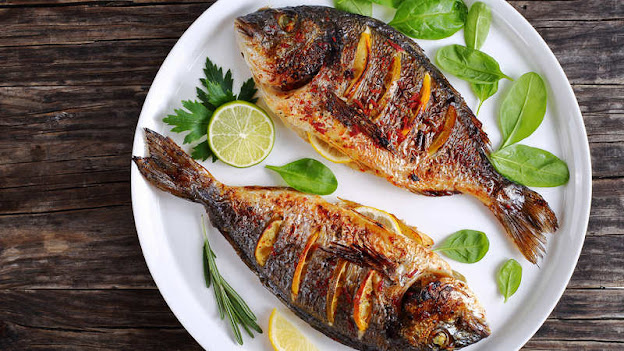Healthy Diet Tips
The main key to a healthy diet is to eat the right amount of calories for how active you are so you balance the energy as well as consume with the energy you use.
If you eat or drink more than your body needs, you will put on weight and If you eat and drink too little, you will lose weight.
You have to eat a wide range of foods to make sure you're getting a healthy diet and your body is receiving all kinds of nutrients it needs.
It is recommended that men have to receive around 2,500 calories a day (10,500 kilojoules). On the other hand, Women should have around 2,000 calories a day (8,400 kilojoules).
Most of the adults in the UK are eating more calories than they need and should eat fewer calories.
If someone eats too much oily fish, it can actually increase the risk. While experts suggest eating up to four portions of oily fish such as mackerel and salmon a week, those who eat more than that actually could have been doing themselves harm.
Non-oily fish includes are: Haddock, Cod, Tuna, Plaice, Skate, Coley and Hake.
You can select from fresh, frozen and canned, but keep in mind that canned and smoked fish can be high in salt.
Most of the people should be eating more fish, but there are suggested limits for some types of fish.
Saturated fat
You need to have some fat in your diet, but it is essential to pay attention to the amount and type of fat you are eating. But make sure not to eat too much saturated fat that can increase the amount of cholesterol in the blood, which increases your risk of growing heart disease.
On an average, men should have no more than 30g of saturated fat a day. As well as women should have no more than 20g of saturated fat a day.
Children who are under the age of 11 should have less saturated fat than adults, but a low-fat diet doesn't fit for children under 5.
Saturated fats are found in many foods, such as: Fatty Cuts of meat, Sausages, Butter, Hard cheese, Cream, Cakes, Biscuits, Lard, Pies.
Try to reduce on your saturated fat intake and
choose foods that contain unsaturated fats alternatively, such as vegetable
oils and spreads, oily fish and avocados.
For keeping your health fit, always use a small amount of vegetable or olive oil, or decreased -fat spread instead of butter, lard or ghee.
Sugar
Foods and drinks high in sugar raise your risk of obesity and tooth decay. Always try to avoid foods and drinks that are high in sugar. Many foods and drinks take on surprisingly high amounts of free sugars.
There are many free - sugar foods and drinks, such as: Sugary fizzy drinks, Sugary breakfast cereals, Cakes, Biscuits, Pastries and Puddings, Sweets and Chocolate and Alcoholic drinks.
Food labels can be helped to find out the sugar free or not. Always remember More than 22. 5g of total sugars per 100g means that food is high in sugar, while 5g of total sugars or less per 100g means that food is low in sugar.
Breakfast is the most important meal for your day. If you do not want to lose your Weight, and then don’t skip your breakfast. Healthy breakfast pleasures include high-fiber grain cereals, low fat milk and dairy products, and fruit. Experts are saying that skipping breakfast may put you down the fast track to weight gain, heart disease, irritability or mood swings, low energy levels, low memory and hormonal stress. So, never ever skip your breakfast.
Enjoy your favourite foods:
Discipline is the key to enjoying rich foods. You don't have to remove them completely,but you can try buying only a small piece of candy instead of whole or buying one fresh bakery cookie rather than a full box.
Lastly, Always eat healthy food and keep your health fit. Keep in mind that you do not break your healthy diet.











No comments